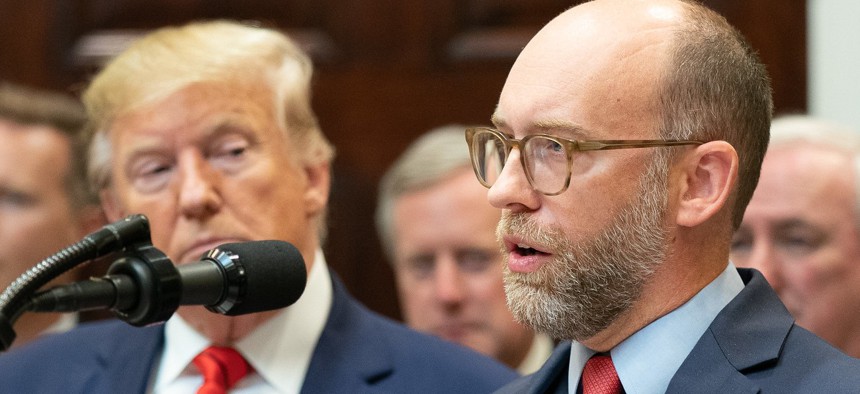
Acting White House Budget Director Russell Vought speaks at a news conference last fall as President Trump looks on. Official White House Photo by Shealah Craighead
White House Gives Agencies 14 Days to Detail Their Plans to Slash Regulations
The Trump administration is doubling down on regulatory rollbacks as a way to spur the economy.
On Tuesday, the Trump administration outlined the information agencies should provide on how they plan to carry out the president’s order to waive or modify any regulations that could impede economic recovery from the recession created by the coronavirus pandemic.
The Office of Management and Budget issued a memo to all executive department and agency heads in a followup to President Trump’s May 19 executive order directing the deregulation effort. Since President Trump took office in January 2017, deregulation has been a cornerstone policy of the administration and the pandemic has only accelerated those plans. The National Bureau of Economic Research officially determined on Monday that the United States is in a recession; February marked the end of a 128-month expansion as the coronavirus began to spread nationwide.
“Just as we continue to battle COVID–19 itself, so too must we now join together to overcome the effects the virus has had on our economy. Success will require the efforts not only of the federal government, but also of every state, tribe, territory, and locality; of businesses, non-profits, and houses of worship; and of the American people,” said the order. “To aid those efforts, agencies must continue to remove barriers to the greatest engine of economic prosperity the world has ever known: the innovation, initiative, and drive of the American people.”
To implement the executive order, Acting OMB Director Russell Vought––who is currently in the confirmation process to become the permanent director––asked agencies to give OMB the following information within the next two weeks:
- Final rules, waivers or other regulatory actions they plan to issue in the next six months to spur economic recovery
- Lists of temporary regulation actions agencies took in response to the pandemic and an explanation of whether or not those changes could be made permanent
- Plans to quickly issue pre-enforcement rulings for entities requesting them, so they know if they are in compliance with the law
- Drafts of policies that allow enforcement discretion for individuals or entities that make a “reasonable attempt” to follow agencies’ coronavirus guidance
“I look forward to working with you as we carry out the president's recent order to revitalize the American economy,” Vought wrote.
As Government Executive previously reported, while many government watchdog groups have long been critical of the administration's aggressive war on regulations, they have grown increasingly worried about regulatory rollbacks during the pandemic.
Robert Weissman, president of Public Citizen, a consumer advocacy nonprofit watchdog, was critical of the initial news that the administration was planning to double down on deregulation to spur an economic rebound. “The deregulatory measures the administration has already taken during the pandemic—rolling back a smog rule, gutting the clean cars fuel economy rule (the most important U.S. climate change program), effectively waiving enforcement of environmental rules—have done far too much damage already,” he said.
Sally Katzen, an NYU Law School professor and former administrator of the Office of Information and Regulatory Affairs during the Clinton administration, told NBC News in April that it’s important to strike a balance between protecting people and slashing red tape.
“There should be a willingness to cut some of the regulatory requirements, but you don't want to threaten health and safety in the name of promoting health and safety,” Katzen said. “There isn't a magic formula for how much you can relax requirements without crossing the line. You want people who are making decisions based on science.”







